Sierra Leone’s Experience Offers Lessons on Building a Professional Armed Forces
BY BRIG. GEN. MICHAEL MOHAMED SAMURA AND COL. STEVEN PARKER
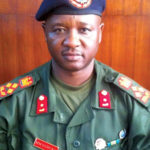
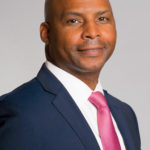
For African countries, improving the security outlook does not require better weapons or larger defense budgets. Instead, the precarious balance of national stability rests largely on the professionalism of security forces. The state of military professionalism is not something that can be changed overnight. It requires a willingness to secure constitutional order, adhere to civilian control and maintain political neutrality. Professionalism also means a commitment to careerlong education and a dedication to a set of values. The world over, some of the hallmarks of professional militaries are discipline, commitment and skill. Military professionals are reliable in all that they do. They know their roles and responsibilities and carry them out well.
Given the rise in homegrown and cross-border extremism, rapidly expanding external economic influence and the implications of a youth bulge, what is the smartest way to invest in the viability of professional security forces in Africa?
The Sierra Leone Experience
Sierra Leone may offer hints at a path forward. The nation’s Army can be traced back to 1897, when the British sought to raise a fighting force to contain French colonial expansion in territories bordering northern Nigeria. The force was raised in 1899 and placed under a unified command known as the West African Field Force. It was among the first armies to be established in West Africa. This force saw action during World War I, fighting with extreme bravery alongside British troops in the Cameroons and in East Africa against German occupation. The experience gained during WWI in difficult terrain against stubborn resistance made the Field Force a valuable reinforcement to British forces in WWII.
At independence in 1961, the Sierra Leone Regiment became the Royal Sierra Leone Military Force and was renamed the Republic of Sierra Leone Military Force (RSLMF) in 1971 when the country became a republic. After a difficult history including several nondemocratic transfers of power and a decadelong civil war, the renamed Republic of Sierra Leone Armed Forces (RSLAF) took on its current structure. A civilian-led Ministry of Defense oversees the military at a strategic level, and the Joint Forces Command directs the RSLAF, which includes three infantry brigades, training and support units, force troops, a maritime wing, and an air wing.
Separation of Powers
Like many African nations, Sierra Leone has endured the consequences of military intervention in political affairs. During 1967 and 1968, various ranks of the military staged three coups and countercoups. These interventions resulted in serious public resentment toward the military. In the years afterward, a paramilitary group was created known as the Presidential Guard Force, and the RSLMF was packed with party loyalists to prevent it from subverting the government. As a result, the Army became heavily politicized and poorly equipped.
In 1996, a new democratically elected government decided to restrain the military in response to the junta that had ruled before. The new government drastically cut resources, ordered mass retirements, removed Soldiers from presidential guards without cause, and raised a Civil Defense Force parallel to the military that competed for the same defense resources. The next year the country experienced another coup, which ultimately led to an intervention by a peacekeeping force led by the Economic Community of West African States.
This history is a cautionary tale of what can happen when a military becomes too politicized and loses popular trust and respect.
Historical lessons drawn from across Africa show that military professionalism is a two-way street. Civilian and military officials agree not to cross into each others’ affairs. The military should enjoy considerable latitude to determine the selection, promotion and posting of personnel, as well as to implement policies of command and control. On the other hand, a professional military must accept state control and subsume such loyalties as ethnicity or regionalism. Officers and Soldiers must accept the rank structure and reject using their coercive capabilities for subnational or individual gains.
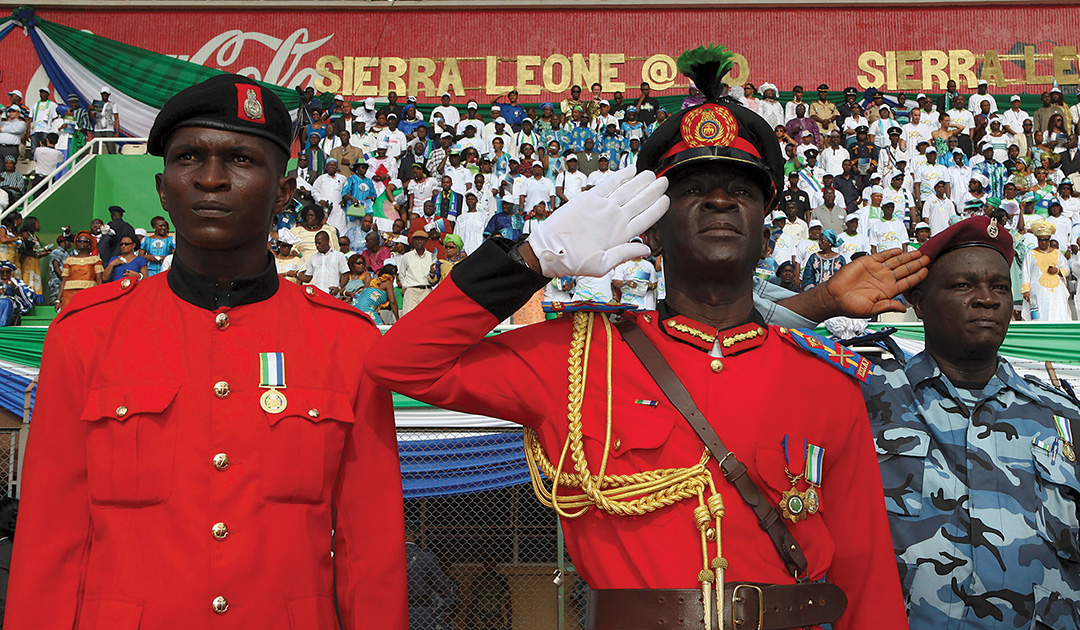
Conditions of Service
Military professionalism depends on deep commitment. Soldiers are required to be committed to the country, the service, their unit and, ultimately, each other and the mission they are tasked to complete. Military work often requires long hours in hazardous conditions with little or no comforts. Commitment allows Soldiers to overcome hardships and push on when their bodies are telling them to quit. At the same time, Soldiers deserve reciprocation from their leadership. Loyalty to subordinates is required if loyalty to sovereign or command is expected in return.
In many parts of Africa, in past decades, the privileged treatment accorded the armed forces was a significant reason for joining the service. Quarters and food were good, and pay was often better than in the civilian sector. A military career offered the advantages of the best medical care for personnel and their families, a retirement plan and survivor benefits.
Today there are signs of depreciation in this realm. Sierra Leone, like many West African countries, struggles with issues of adequate pay. In recent years, protests by disgruntled Soldiers over pay and conditions have been reported in Cameroon, Côte d’Ivoire, Liberia and elsewhere. Housing also is a contentious issue. It is not uncommon to see Soldiers who do not receive a housing allowance living out of the barracks at their own expense and Soldiers in provincial units living in substandard housing they build themselves. Pensions for retiring officers also are low in the region, and it is not unheard of to see an officer retire from a high rank only to be forced to find work as a security guard. These difficult conditions of work are one factor that pushes African Soldiers to corruption.
African governments should nurture loyalty through improved conditions of service. This not only helps morale, it makes the institution more attractive and ensures that the military does not suffer from attrition.
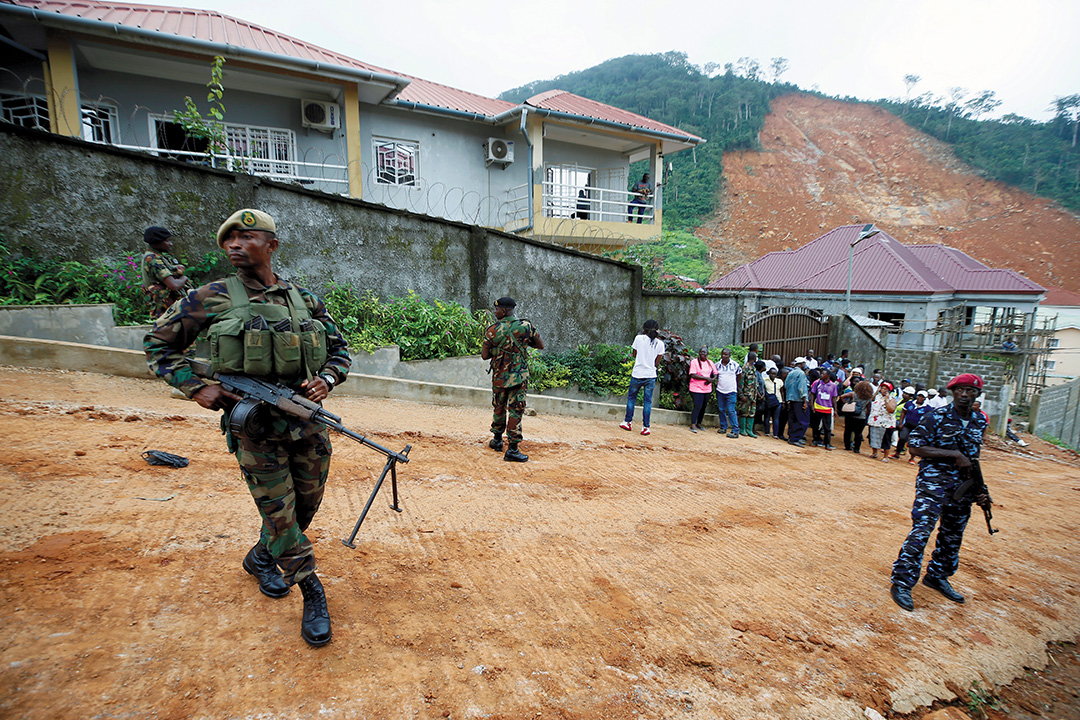
Living by a Code
A code of conduct is a disciplinary tool that gives Soldiers direction on how to act within the morals of the military. When used correctly, it is the norm for behavior and represents the core values under which the military should thrive as a noble institution accountable to its people. Ideally, Soldiers memorize the code of conduct. Many crimes committed by Soldiers in and out of barracks are a result of ignorance of the code. Like many militaries around the world, the RSLAF has a code of conduct. Its list of “do’s” includes:
- Remain loyal to the nation, the head of state and commander in chief, and the chain of command.
- Be always disciplined, punctual, properly dressed, and conduct yourself in a polite and courteous manner.
- Strive to constantly improve your professional ability, and work diligently and efficiently.
- Display leadership by remaining calm in times of pressure, and accept responsibility for your mistakes.
- Be fair, frank and honest at all times, and display integrity.
The list of “don’ts” includes:
- Never blame others, especially your subordinates, for your mistakes.
- Never betray a confidence unless keeping it compromises your integrity.
- Do not speak ill of your superiors, peers or subordinates unnecessarily to others.
- Do not put your or another’s interests ahead of the Armed Forces.
- Do not allow your personal feelings to affect your treatment of other officers or Soldiers.
The aim of any code of conduct should be to shape behavior rather than to look out for culprits to punish. Soldiers should not only learn these values during basic training, but they should also live them every day in everything they do, whether they are at work or off. The Army core values are what being a Soldier is all about. The more people are reminded of them, the greater likelihood that they will inculcate and live them, and the better disciplined and reputable the institution will be.
Training, Education and Operational Ethos
Training is the cornerstone of operational readiness. For military professionalism, neither the discipline of a Zen master nor the commitment of a zealot will mean much without skill. Skill allows Soldiers to complete missions assigned to them. An infantryman needs to be able to shoot, an engineer to build and a pilot to fly. A deficit of knowledge can be the difference between life and death when someone has only seconds to react.
During Sierra Leone’s long and costly civil war, the country recruited widely to swell the Army’s ranks. Quality and standards suffered. In the late 1990s, public confidence was at such a low point that the idea of disbanding the Army was entertained. By the end of the war, in 2002, the force size had increased to 15,500, an unsustainable number.
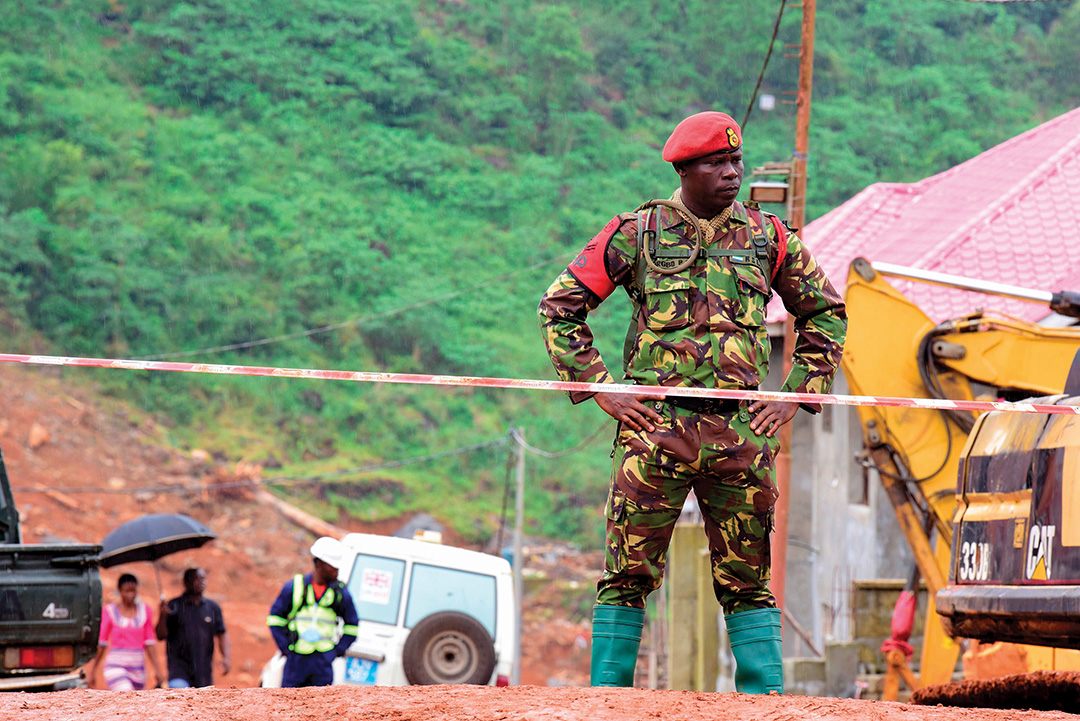
AFP/GETTY IMAGES
Upon returning to peace, Sierra Leone made an official request to the British government to help with retraining and reconstituting the Army. A British Short Term Training Team became part of an International Military Advisory and Training Team sent to Sierra Leone, and retraining began in 2000. By 2003, 13 battalions had been retrained and deployed nationwide. The program also gave an opportunity to qualified ex-combatants to join the military through the Military Reintegration Program. By 2010 the force size was set at 8,500.
Sierra Leone is now working hard to increase access to training and raise standards across the military. It operates a system in which one-third of the force is undergoing training at any given time while others are either on operations or regimental routine duties.
Evidence of improvement was seen in 2013 when Sierra Leone sent 850 peacekeepers to Somalia. After years of being the site of a United Nations peacekeeping mission, it was a major source of pride to be able to return the favor and assist another country in need.
Current and Future Opportunities
One place to focus on improved access to training in Africa is with noncommissioned officers (NCOs). They must be empowered with the knowledge to take some burden off officers and be able to take initiative without direct supervision. Many armies have well-developed NCO training and education systems with a series of courses that are incremental and promotional. The British Army, for example, includes lessons on national and international military studies, language, mathematics, driving and information technology.
Armed forces across Africa must follow suit and ensure that already well-arranged NCO courses are required for all NCO promotions.
When it comes to officer cadet recruiting, many countries use the officer training corps system in which university students complete certain military modules and are encouraged to join the armed forces after graduating. Those who choose to join the army are given scholarships. Others use direct commissioning of professional degree holders from civil service. These programs are important to attract the best young candidates into the service.
An army’s professional military education reveals much about the characteristics it seeks in its personnel and about that army overall. Consider including nonmilitary and nonoperational subjects in officer training curricula and invite university lecturers, representatives from government ministries, and retired senior officers to instruct on certain topics. Look at sending officers to study abroad in countries that offer studies in unique and strategic military disciplines. Disciplines such as research and development, procurement and systems automation, among others, remain essential yet unexplored. Developing leaders through formal training, education and experience should be the hallmark of all militaries.
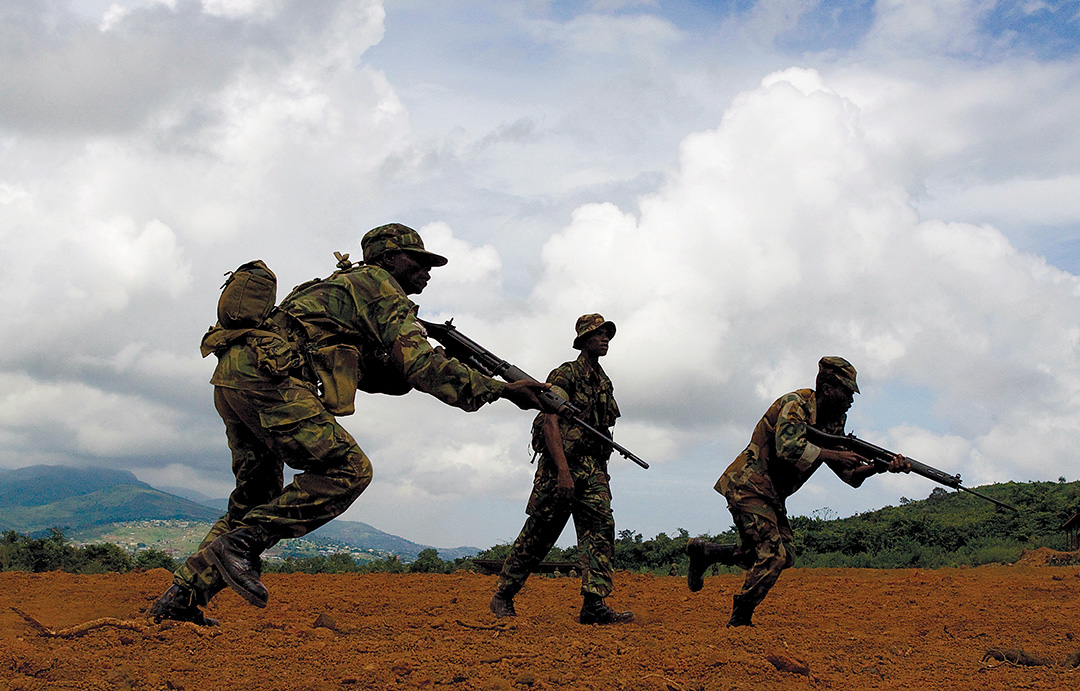
Stronger Together
African armies are now increasingly ready to strengthen their own professional military educational institutions and establish meaningful partnerships within their regions and beyond. They want to engage in strategic partnerships that yield near-term and long-term results. This is not about simply throwing money at more training and more equipment. Training is highly perishable, and equipment is only as valuable as the operator using it and the strategy behind it. This is about building relationships and strengthening institutions. Professional military education can produce better self-sufficiency and better outcomes for Africa and its armies for years to come.
Brig. Gen. Samura of the Republic of Sierra Leone Armed Forces is the assistant chief of Defence Staff for Training & Doctrine. Col. Parker, who is retired from the U.S. Army, was the lead officer for the African Military Education Program and senior military advisor to the Africa Center for Strategic Studies.
Africa’s Professional Military Education Institutions
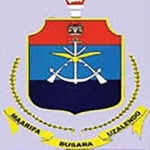 National Defence College-Kenya
National Defence College-Kenya
ndc.go.ke
Opened: 1997
Location: Karen
Commandant: Lt. Gen. L.M. Ngondi
History: For years, Kenya sent its officers abroad for training. In the 1990s, the country saw a need for self-reliance in training due to the increasing cost and limited vacancies at other schools. In May 2000, the college moved to a new complex in Karen, which allowed it to increase its training capacity to 40 participants from nine nations. The college was accredited through the University of Nairobi in 2002 to offer diploma and master’s of arts degrees in international studies.
Curriculum: The NDC certification course lasts 48 weeks and includes four terms. The terms are themed: foundation studies, domestic studies, international and domestic comparison, and security strategies.
Mission: To prepare senior military officers and equivalent senior civil servants of the Republic of Kenya and their counterparts from friendly countries for higher responsibilities in the strategic direction and management of security and other related areas of public policy.
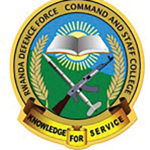 Rwanda Defence Force Command and Staff College
Rwanda Defence Force Command and Staff College
rdfcsc.mil.gov.rw/about-us
Opened: 2012
Location: Kigali
Commandant: Maj. Gen. J.B. Kazura
History: Seeing a need to invest more in training, Rwanda established the college as a next step above the Rwanda Military Academy. The college was established with assistance from the United States Army Command and General Staff College in Fort Leavenworth in the United States and the Joint Services Command and Staff College in the United Kingdom.
Curriculum: The college trains officers from various Rwandan Defence Force services and formations. It also admits students from allied regional defense forces. The college is accredited through the National University of Rwanda and offers master’s and postgraduate diplomas in security studies. Its Senior Command and Staff Course prepares officers for higher appointments by developing their command and leadership skills, training in single and joint services, and combined and interagency operations.
Mission: To develop officers’ intellectual and professional competencies in the command and control of the defense forces as well as conducting research in defense and security issues in order to respond effectively to the challenges of the complex and dynamic operating environment.
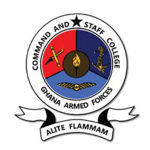 Ghana Armed Forces Command and Staff College
Ghana Armed Forces Command and Staff College
gafcscmil.edu.gh
Opened: 1963
Location: Accra
Commandant: Rear Adm. Seth Amoama
History: Ghana has participated in international peacekeeping missions since 1960 when it took part in the United Nations mission in the Republic of the Congo. This, and other factors, led the Ghana Armed Forces to widen the scope of education available to its officers. In its more than five decades of operation, the college has collaborated with the University of Ghana and the Ghana Institute of Management and Public Administration, as well as Cranfield University and Bradford University in the U.K. Recently it has expanded facilities, including adding new classrooms, administrative offices, an auditorium, a video conference room and a library.
Curriculum: It offers junior and senior military programs, graduate academic programs, and international programs. The senior military program includes three terms and modules on topics including defense management, conflict and crisis, and the exclusive economic zone.
Mission: To train middle-level officers of the Ghana Armed Forces, other security services, qualified civilians and officers of friendly armed forces for middle-level policy, command, staff and leadership functions in joint, combined and multiagency operations. To provide higher engagements within the national and international environment.
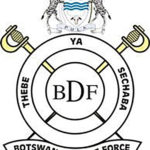 Botswana Defence Command and Staff College
Botswana Defence Command and Staff College
gov.bw/en/Ministries–Authorities/Ministries/State-President/Botswana-Defence-Force-BDF/Training–Recruitment
Opened: 2008
Location: Gaborone
Commandant: Brig. Gen. Papadi Monnatlhare
History: In 2004, the Defence Council of the Botswana Defence Force (BDF) recognized that the limited number of vacancies at foreign institutions was restricting officers’ access to training. It established the Defence Command and Staff College in January 2008.
Curriculum: The college works in partnership with the University of Botswana, which delivers about 30 percent of the curriculum. Work is underway on associate status with the University of Botswana and will award a diploma in military and strategic studies.
Mission: To provide commanders and staff officers with a military training program that is relevant to the operational environment of Botswana, using the terrain and equipment that BDF has and under the unique circumstances that prevail in Botswana.
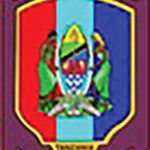 United Republic of Tanzania National Defence College
United Republic of Tanzania National Defence College
ndctz.go.tz
Opened: 2012
Location: Dar es Salaam
Commandant: Maj. Gen. Y.H. Mohamed
History: Since independence, the Tanzania People’s Defence Force found ways to give its officers access to education, typically through training abroad in partner nations. In 1998, leaders of the military headquarters formed a committee to examine the possibility of opening a college. Construction was completed in 2011, and the first NDC courses were conducted in September 2012.
Curriculum: The program consists of four course terms, two strategic exercises, dissertations and four field practical training sessions. Modules in the four course terms focus on foundational studies, Tanzania’s security environment, the international security environment and strategies for national security. Admission is open to defense professionals, security personnel, civilian employees of ministries, and other organizations and personnel from allied militaries.
Mission: To equip senior defense and government policymakers with the necessary background and understanding of the total system of economic, political, military, scientific, international relations, national organizational aspects and the planning necessary for national security, both in its internal dynamics and external compulsions.
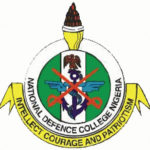 National Defence College Nigeria
National Defence College Nigeria
ndc.gov.ng
Opened: 1992
Location: Abuja
Commandant: Rear Adm. Adeniyi Adejimi Osinowo
History: The NDC follows in the training tradition established by the Nigerian Defence Academy in Kaduna for cadet training and the Armed Forces Command and Staff College in Jaji for middle-level staff training. As a strategic-level training institution, it serves all three service branches of the Nigerian Armed Forces. In 1995, it moved from Lagos to Abuja, and plans are underway to relocate to a permanent campus in the Jabi District of Abuja.
Curriculum: It is designed to be provocative, demanding and rigorous. Participants face a variety of problems for which there is no “template solution.” They are encouraged to consider and challenge their own intellectual assumptions and standpoints about the nature of war, peace, leadership, politics, ethics and the application of force.
Mission: To impart knowledge and develop expertise and skills of senior military officers and their civilian counterparts through a firm understanding of all the essential factors that impact national security and prepare them for higher responsibilities at operational and strategic levels in both national and international assignments.
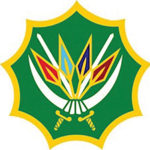 South African National Defence College
South African National Defence College
defcol.mil.za
Opened: 1973
Location: Pretoria
Commandant: Brig. Gen. M.P. Sereko
History: From 1973 to 1999, the college offered 42 joint staff courses and 18 special joint staff courses. The curriculum was redesigned after independence and, in 2001, the college was renamed with its current title. In 2015, it launched its Security and Defence Studies Programme Management Studies.
Curriculum: The SANDC is the premier institution of the South African National Defence Force, allowing senior leaders — both civilian and military — to learn security issues and policy/strategy formulation. The college is a center of excellence in academic and research pursuits in diversified disciplines, providing inputs on national security at the strategic level. The defense college bolsters higher education in policy and strategy formulation and acts as a national think tank.
Mission: To educate competent and credible strategic leaders in security and defense studies to confidently confront the national, regional, continental and global environments.

